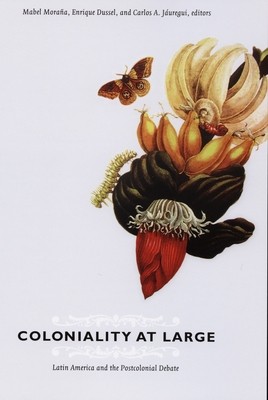
- We will send in 10–14 business days.
- Publisher: Duke University Press
- ISBN-10: 0822341697
- ISBN-13: 9780822341697
- Format: 15.2 x 23.1 x 3.8 cm, softcover
- Language: English
- SAVE -10% with code: EXTRA
Coloniality at Large (e-book) (used book) | bookbook.eu
Reviews
Description
Postcolonial theory has developed mainly in the U.S. academy, and it has focused chiefly on nineteenth-century and twentieth-century colonization and decolonization processes in Asia, Africa, the Middle East, and the Caribbean. Colonialism in Latin America originated centuries earlier, in the transoceanic adventures from which European modernity itself was born. Coloniality at Large brings together classic and new reflections on the theoretical implications of colonialism in Latin America. By pointing out its particular characteristics, the contributors highlight some of the philosophical and ideological blind spots of contemporary postcolonial theory as they offer a thorough analysis of that theory's applicability to Latin America's past and present.
Written by internationally renowned scholars based in Latin America, the United States, and Europe, the essays reflect multiple disciplinary and ideological perspectives. Some are translated into English for the first time. The collection includes theoretical reflections, literary criticism, and historical and ethnographic case studies focused on Ecuador, Guatemala, Mexico, Brazil, the Andes, and the Caribbean. Contributors examine the relation of Marxist thought, dependency theory, and liberation theology to Latin Americans' experience of and resistance to coloniality, and they emphasize the critique of Occidentalism and modernity as central to any understanding of the colonial project. Analyzing the many ways that Latin Americans have resisted imperialism and sought emancipation and sovereignty over several centuries, they delve into topics including violence, identity, otherness, memory, heterogeneity, and language. Contributors also explore Latin American intellectuals' ambivalence about, or objections to, the "post" in postcolonial; to many, globalization and neoliberalism are the contemporary guises of colonialism in Latin America.
Contributors: Arturo Arias, Gordon Brotherston, Santiago Castro-Gómez, Sara Castro-Klaren, Amaryll Chanady, Fernando Coronil, Román de la Campa, Enrique Dussel, Ramón Grosfoguel, Russell G. Hamilton, Peter Hulme, Carlos A. Jáuregui, Michael Löwy, Nelson Maldonado-Torres, José Antonio Mazzotti, Eduardo Mendieta, Walter D. Mignolo, Mario Roberto Morales, Mabel Moraña, Mary Louise Pratt, AnÃbal Quijano, José Rabasa, Elzbieta Sklodowska, Catherine E. Walsh
EXTRA 10 % discount with code: EXTRA
The promotion ends in 15d.01:22:10
The discount code is valid when purchasing from 10 €. Discounts do not stack.
- Publisher: Duke University Press
- ISBN-10: 0822341697
- ISBN-13: 9780822341697
- Format: 15.2 x 23.1 x 3.8 cm, softcover
- Language: English English
Postcolonial theory has developed mainly in the U.S. academy, and it has focused chiefly on nineteenth-century and twentieth-century colonization and decolonization processes in Asia, Africa, the Middle East, and the Caribbean. Colonialism in Latin America originated centuries earlier, in the transoceanic adventures from which European modernity itself was born. Coloniality at Large brings together classic and new reflections on the theoretical implications of colonialism in Latin America. By pointing out its particular characteristics, the contributors highlight some of the philosophical and ideological blind spots of contemporary postcolonial theory as they offer a thorough analysis of that theory's applicability to Latin America's past and present.
Written by internationally renowned scholars based in Latin America, the United States, and Europe, the essays reflect multiple disciplinary and ideological perspectives. Some are translated into English for the first time. The collection includes theoretical reflections, literary criticism, and historical and ethnographic case studies focused on Ecuador, Guatemala, Mexico, Brazil, the Andes, and the Caribbean. Contributors examine the relation of Marxist thought, dependency theory, and liberation theology to Latin Americans' experience of and resistance to coloniality, and they emphasize the critique of Occidentalism and modernity as central to any understanding of the colonial project. Analyzing the many ways that Latin Americans have resisted imperialism and sought emancipation and sovereignty over several centuries, they delve into topics including violence, identity, otherness, memory, heterogeneity, and language. Contributors also explore Latin American intellectuals' ambivalence about, or objections to, the "post" in postcolonial; to many, globalization and neoliberalism are the contemporary guises of colonialism in Latin America.
Contributors: Arturo Arias, Gordon Brotherston, Santiago Castro-Gómez, Sara Castro-Klaren, Amaryll Chanady, Fernando Coronil, Román de la Campa, Enrique Dussel, Ramón Grosfoguel, Russell G. Hamilton, Peter Hulme, Carlos A. Jáuregui, Michael Löwy, Nelson Maldonado-Torres, José Antonio Mazzotti, Eduardo Mendieta, Walter D. Mignolo, Mario Roberto Morales, Mabel Moraña, Mary Louise Pratt, AnÃbal Quijano, José Rabasa, Elzbieta Sklodowska, Catherine E. Walsh


Reviews